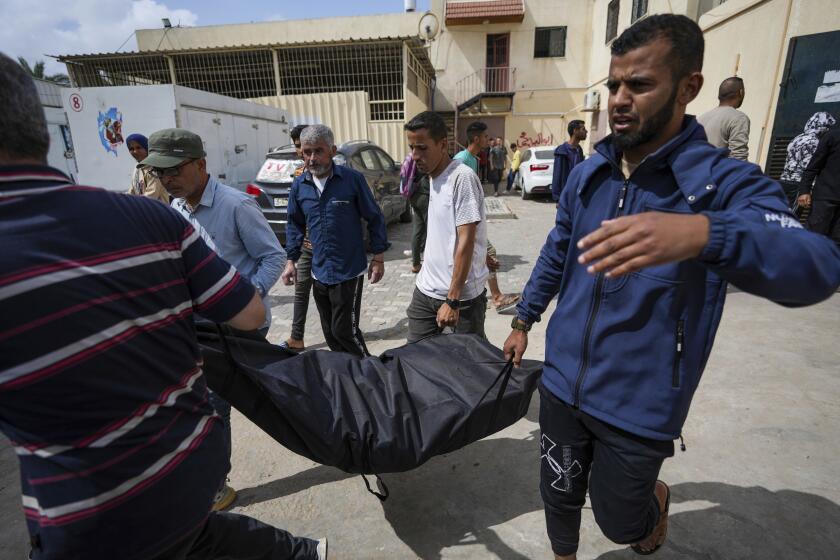Arizona couple near border have complex view of illegal immigration
ARIVACA, Ariz. — When Jim Chilton tends to the cattle on his 50,000-acre ranch in southern Arizona, he packs at least two guns and no less than 5 gallons of water.
A pistol and a rifle are to ward off the drug smugglers who encroach on his land abutting the U.S.-Mexico border.
Drums of water in the bed of his Ford truck are for thirsty border crossers lured by U.S. jobs.
RELATED: Is the border secure?
Unlike much of the heavily fortified border fence in Arizona, the only barriers separating Chilton’s ranch from Mexico are four strands of rusty barbed wire, strung along steel posts.
Chilton, a fifth-generation rancher, and his wife, Sue, are on the front lines of border security. They live it every day.
The debate over border security and illegal immigration sometimes gets ugly and shrill. But the Chiltons have developed a nuanced view of the border, gingerly balancing their desire for security — he’s 73, she’s 70 — with the reality of having desperate wanderers cross their land, starved and parched.
“We don’t want corpses on our ranch,” Sue Chilton said.
On a recent sunny day, Jim Chilton negotiated their truck along narrow and windy Ruby Road, the only drivable path near the border in this region about 70 miles southwest of Tucson. The dirt road snakes about 12 miles north of the border, past surveillance camera towers that loom high above gold-splashed pastures dotted with white oaks.
The couple drove by javelina hunters encamped on their ranch as well as Tucson Samaritans, a humanitarian group dropping off water for border crossers. Jim Chilton slowed down as he passed both parties, waving hello and sometimes stopping to chat.
MAP: Enforcement and apprehension rates
“It’s just good people trying to do good,” he said of the Samaritans.
The rancher recalled the time he came across a teenage boy who begged for water.
“Agua! Agua!” the boy cried out at him. Jim Chilton obliged, and the boy asked how far it was to St. Louis.
Jim Chilton shook his head at the memory, lamenting how unprepared many of the border crossers are before heading into the desert.
Although he respects the Border Patrol agents in the region, he said, he doesn’t understand why they won’t fortify and build a substantial border fence along the Arivaca region, including the five miles of international boundary alongside his ranch.
It’s inhumane, he said, to allow border crossers to walk in easily through the border, putting their lives at risk from cold nights and hot days. Many are apprehended farther inland anyway.
“The border should be secured at the border,” he said.
The couple lament a recently shuttered Border Patrol outpost, the agency’s only significant presence in that area. The outpost, which operated near the ranch, was closed because of budget cuts.
The couple have even offered to lease 20 acres of their land — about 500 yards from the border — to Border Patrol officials for $1 a year for an outpost. They said the government had not taken them up on the offer.
Scraggly mesquite branches sticking into the roadway grasped at Jim Chilton’s truck, shrieking as he turned off to a side road. At a clearing, he got out and crouched beneath a gnarled oak crowned with enough leaves to form a canopy that veiled a dumping ground.
Empty cans of tuna, Spam and Mexican-brand juices littered the ground, along with electrolyte containers, energy drinks and a cheap brandy bottle. There was also a sole-less shoe, a backpack and a single sock.
“We’ve got lots of sites like this on our ranch,” he said.
Nearby were distressed and sun-bleached burlap sacks — all that was left of drug smugglers who dropped bundles of marijuana after spotting Jim Chilton climb out of his truck with his 12-gauge shotgun. That was about two months ago.
It’s unclear whether those men were armed, but Chilton knows some smugglers are.
“The problem is the druggers out there have AK-47s,” he said. He looked around at the surrounding mountains and hills.
“You have no idea who is watching us now,” he said before turning back toward his truck.
Chilton, with speech patterns reminiscent of Mr. Rogers — if Mr. Rogers spoke with a twang — has ranching in his blood. His father was a dairy farmer in the Phoenix area, and he grew up in the life until he left for college, where he met Sue. He made a good amount of money working in finance in Los Angeles, before returning to ranching and buying some land in the 1980s and the rest of it about a decade later. He owns a couple of thousand acres outright and leases the majority of the 50,000 acres from the state and federal government for cattle grazing.
It used to be that border crossers were simply part of the normal rhythm of life, Sue Chilton said. People would come and go freely between the Mexican state of Sonora and Arizona to work.
“You’d feed them and give them water and directions,” Jim Chilton said.
By the early 2000s, the traffic increased, overwhelming the region and its ranchers. About two years ago, migrant traffic slowed; an increase in drug smuggling made it too dangerous.
Now, the couple are more guarded offering help. “At this point, I’m not opening the door except in the rarest of cases,” Sue Chilton said.
Two years ago on a frigid Christmas Day, a middle-aged man huddling underneath a thin cotton blanket knocked on their door.
“It’s Christmas and a stranger knocks on your door,” Sue Chilton recalled. “What do you say?”
The Chiltons opened their door and listened to his story. Sue Chilton, with a master’s degree in Spanish, translated for her husband.
This was the man’s first trip trekking north. At one point his traveling companion and friend, who knew the way, fell off a ridge and died. The man had twisted his ankles and wandered the desert for seven days without food and little water.
Recently returned from Mass and a potluck, Sue Chilton reheated and dished up tamales and beans. Worried they may unintentionally violate laws against aiding and abetting immigrants in the country illegally, the couple didn’t allow the man to spend the night in the house. Instead, they crafted a bed for him on the porch. She wrapped him up in layers of comforters, quilts and blankets and served him some extra hot coffee. The next morning she cooked eggs and bacon for the traveler, who said he was ready to return to Mexico.
“I told him how to get caught by the Border Patrol,” Jim Chilton said, advising him to simply walk on the main road.
Sue Chilton handed the man $45 before he hobbled away.
Not all who wander on the Chilton ranch are harmless migrants. Some are surly and impolite and seem downright dangerous, the couple said.
But the Chiltons have also run across migrants who are thankful and respectful. On one of their fences the couple posted a sign in Spanish: “Please close the gate behind you.”
Travelers rarely leave the gate open. She explained that most border crossers come from poor, rural areas in Mexico and have deep respect for ranching etiquette because of it.
She walked along a gully, toward a 750-gallon water trough, one of 19 on their ranch. Jim Chilton set down his gun and turned on the knob of an elementary-school-style water fountain affixed to the trough.
“We think it’s the humanitarian thing to do,” he said, pressing on the knob. “This is one of our solutions.”
But nothing came out of the faucet. He tried again, pressing harder.
Again, nothing. Someone, probably a thirsty border crosser, must have cut the main line to obtain water, Chilton reckoned, not realizing there was a spigot nearby.
On the drive home, Chilton laid out solutions that he said could possibly alleviate his problem.
The Chiltons support some sort of guest worker program, akin to the federal program of the 1940s when temporary Mexican laborers worked legally in the United States.
“We used to have a bracero program and everything was legal,” Jim Chilton said.
His wife chimed in: “No paying the cartel. No dying in the desert.”
The Chiltons said they supported the recent President Obama policy that gave immigration relief to young people who were brought illegally to the United States as children.
They support the legalization of the millions who are here without papers, but at the same time agree with Arizona Gov. Jan Brewer that it should be done only after every bit of the border is secure. They believe it’s the only way to battle the drug smugglers — “the real scary ones,” Jim Chilton called them.
At least two neighboring ranchers have left in recent years because of the security situation, Chilton said. Still, the couple intend to stay on their land.
Staying has proved costly.
Maintaining water lines and the international fence from slashing and trampling has cost the couple thousands of dollars in repairs.
“We have to maintain the fence or the cattle would all go to Mexico, y no hablan español,” Sue Chilton said in Spanglish.
She gazed out at the trails on the other side of the measly fence, which stretches 15 miles east until it hooks up with an actual border wall in Nogales. She pointed out a network of trails that scar a hill on the Mexican side. It zigzags, leading toward the international fence on the Chilton’s ranch.
“It’s almost as though we have ceded a swath of this United States of America.... It has been ceded to operational control of the cartels,” she said.
A few feet away, Jim Chilton looked for discarded barbed wire on the ground to patch up a gaping hole on the fence. He’d accidentally left spare wire back at the house.
He pulled at a warped and frayed strand of wire.
“You see where they crawl underneath the fence? Right here,” he said, pointing to a spot of flattened and yellowed grass. “This is not a cow.”
The rancher pulled out a set of pliers. No gloves. He winced, twisting the oxidized wire with his strong and weathered hands.
“And the thing is that you’re going to have to do hundreds of these,” he said.
He tightened the wire some more.
More to Read
Start your day right
Sign up for Essential California for news, features and recommendations from the L.A. Times and beyond in your inbox six days a week.
You may occasionally receive promotional content from the Los Angeles Times.







